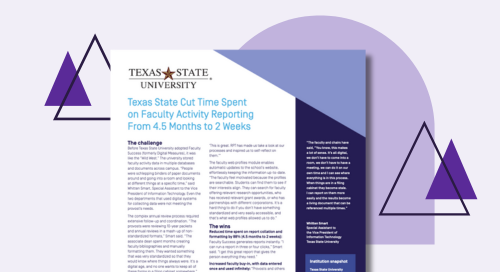
“The faculty and chairs have said, “You know, this makes a lot of sense. It’s all digital, we don’t have to come into a room, we don’t have to have a meeting, we can do it on our own time and I can see where everything is in this process. When things are in a filing cabinet they become stale. I can report on them more easily and the results become a living document that can be referenced multiple times.”
Whitten Smart
Special Assistant to the Vice President of Information Technology – Texas State University


Before Texas State University adopted Faculty Success (formerly Digital Measures), it was like the “Wild West.” The university stored faculty activity data in multiple databases and documents across campus. “People were schlepping binders of paper documents around and going into a room and looking at different things at a specific time,” said Whitten Smart, Special Assistant to the Vice President of Information Technology. Even the two departments that used digital systems for collecting data were not meeting the provost’s needs.
The complex annual review process required extensive follow-up and coordination. “The provosts were reviewing 10-year packets and annual reviews in a mash-up of non-standardized formats,” Smart said. “The associate dean spent months creating faculty bibliographies and manually formatting them. They wanted something that was very standardized so that they would know where things always were. It’s a digital age, and no one wants to keep all of these forms in a filing cabinet somewhere.”
The provost implemented Faculty Success to standardize the annual review process. “The provost’s office and the different chairs like to see how active their faculty are,” Smart said. “Now they can produce reports that say, for example, ‘Your faculty produced 472 publications in the last two years.’”
The Review, Promotion and Tenure (Workflow) module supports Texas State’s complex review process. “The faculty and especially the chairs have come in and said, ‘This makes a lot of sense,’” Smart said. “‘Now it’s all digital. We don’t have to come into a room. We don’t have to have a meeting to do all this. We can do it on our own time and see where everything is in this process.’ Faculty and chairs are telling us, ‘This is great. RPT has made us take a look at our processes and inspired us to self-reflect on them.’”
The faculty web profiles module enables automatic updates to the school’s website, effortlessly keeping the information up-to-date. “The faculty feel motivated because the profiles are searchable. Students can find them to see if their interests align. They can search for faculty offering relevant research opportunities, who has received relevant grant awards, or who has partnerships with different corporations. It’s a hard thing to do if you don’t have something standardized and very easily accessible, and that’s what web profiles allowed us to do.”
Faculty Success generates reports instantly. “I can run a report in three or four clicks,” Smart said. “I get this great report that gives the person everything they need.”
“Provosts and others at the university have used web profiles to start highlighting what their departments are doing,” Smart said. When things are in a filing cabinet, they become stale. I can report on them more quickly, and the results become a living document that I can reference multiple times.”
Each of Texas State’s 46 departments can now customize their reports for their annual review. “We accommodate 52 ways within Faculty Success,” Smart said. “When the committees get together, it’s standardized and reportable.”
The associate dean no longer spends months creating faculty biographies and manually formatting them.

See how our tools are helping clients right now, get in-depth information on topics that matter, and stay up-to-date on trends in higher ed.